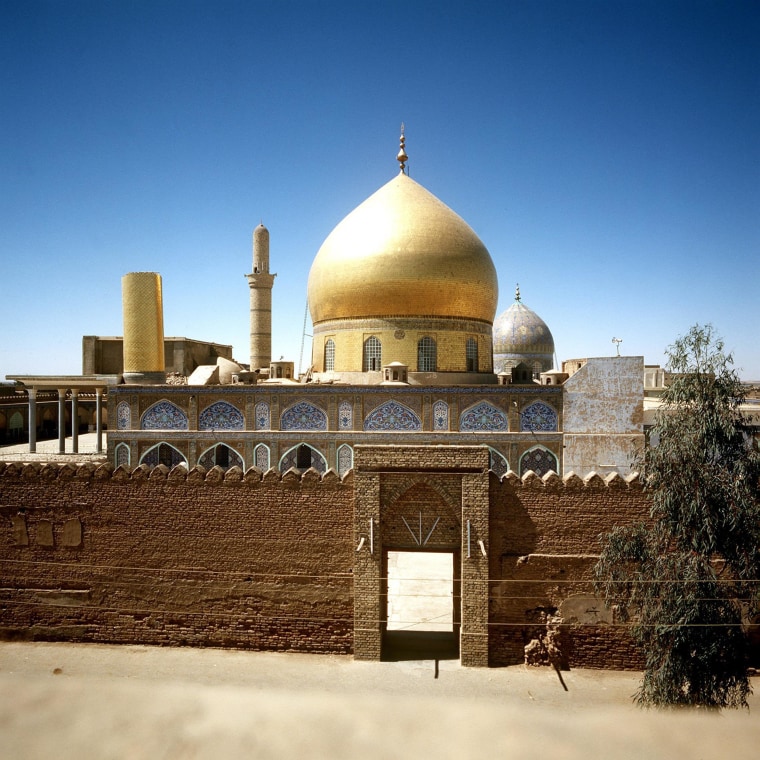The enemy is now at the gates.
Not the gates of Baghdad – which militants from the Islamic State of Iraq and al-Sham (ISIS) - have vowed to overrun – but the gates of one of Shiite Islam’s holiest sites, and a potential trigger for all-out civil war.
Sign up for breaking news alerts from NBC News
Mortars landed overnight at the golden-domed al-Askari mosque and injured at least 14 people, according to Reuters.
The shrine holds the tombs of Ali al-Hadi, who died in 868, and his son Hassan al-Askari, who died in 874 – both descendants of the Prophet Muhammad and considered by Shiites to be among his successors.
Al Qaeda’s bombing of the revered shrine in 2006 unleashed floods of sectarian violence which killed thousands and pushed Iraq down the path of full scale civil war.
"I think the ramifications of such an attack would be felt across the region and not just in Iraq itself"
With ISIS -- the Sunni militant group that has now rebranded itself the Islamic State and declared a caliphate in Iraq and Syria -- intent on attacking it again, fears run high that any serious damage to the site would trigger another explosion of Sunni-Shiite violence.
Tensions have existed between Shiites and Sunnis for 1,400 years.
Hayder al-Khoei, an Iraq analyst for London-based think tank Chatham House, said the shrine "could play a crucial role in igniting an all-out Sunni-Shia civil war in Iraq."
He added: “An attack on such an important sacred symbol would be seen as an attack on Shiism itself, not just Shias. It would be extremely difficult for anyone to control the outburst of emotions and violence that it would create. Given how sectarianized the Middle East is right now, I think the ramifications of such an attack would be felt across the region and not just in Iraq itself."
Sunni militants have been squeezing Samarra – about 60 miles north of Baghdad - for weeks, with the White House watching warily for signs of an advance.
Secretary of State John Kerry said last week that "everyone understands that Samarra is an important line."
"Historically, an assault on Samarra created enormous problems in Iraq. That is something that we all do not want to see happen again," he said in Baghdad. "The president and the team, the entire security team, are watching this movement and these events very, very closely."
Iraq’s Shiite-led government has made protecting Samarra a priority, sending in thousands of troops to reinforce the city. Prime Minister Nouri al-Maliki personally visited last month to pray at the shrine and meet the city’s chief military commander.
ISIS militant are intent on destroying anything that stands in the way of their caliphate.
Top Shiite clerics have urged their followers to take up arms and defend holy sites – which are now heavily guarded. Firebrand anti-American cleric Muqtada al-Sadr last week vowed that his supporters will "shake the ground" in the fight against Sunni militants. Iranian President Hassan Rouhani has also said his country would protect Shiite holy sites in neighboring Iraq from "killers and terrorists."
While Samarra is considered a red line, violence in Iraq has reached staggering levels in the last month as ISIS militants press on with their lightning-fast offensive.
The United Nations said more than 2,400 people were killed in Iraq in June – the deadliest month for the country this year. The toll included more than 1,500 civilians and more than 850 members of Iraq’s security forces.
As a stopgap measure, President Barack Obama sent 300 more U.S. troops to Iraq – most of which will provide security for the American Embassy and other facilities, such as Baghdad’s airport. That brings the number of additional U.S. troops sent to Iraq since the current crisis exploded to nearly 800.
